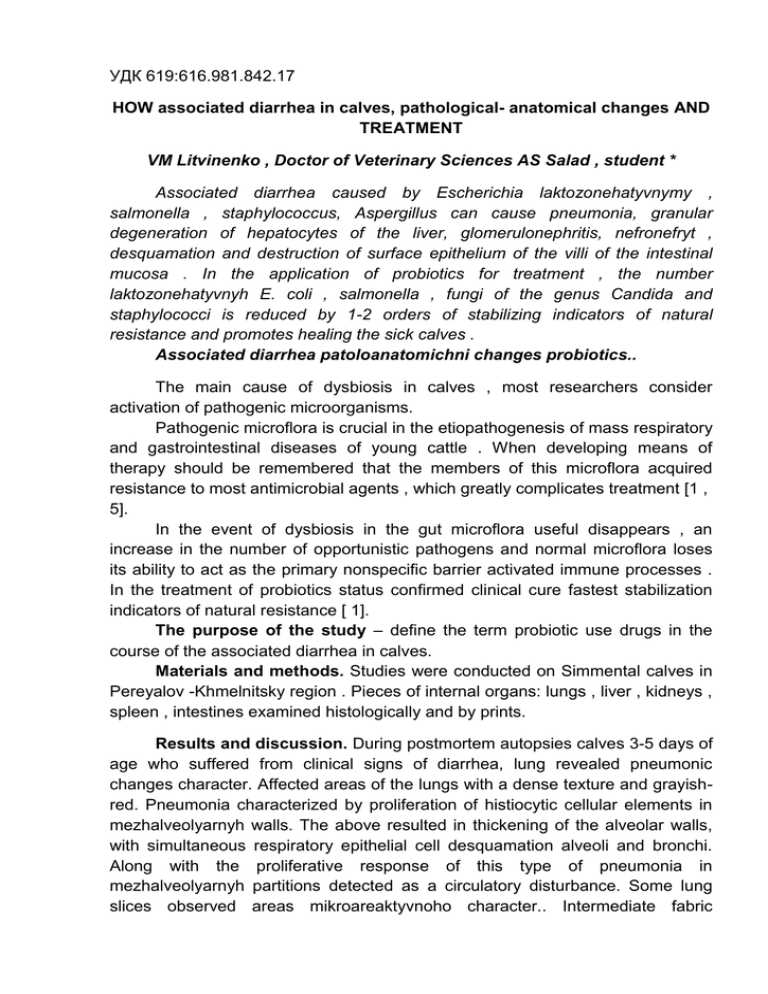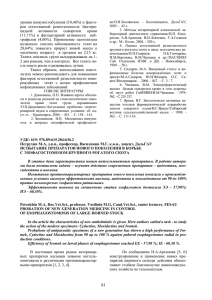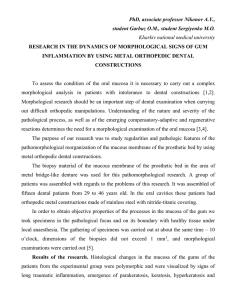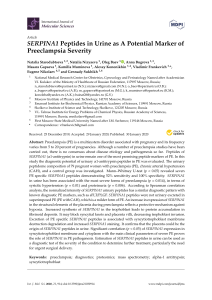HOW associated diarrhea in calves, pathological
реклама

УДК 619:616.981.842.17 HOW associated diarrhea in calves, pathological- anatomical changes AND TREATMENT VM Litvinenko , Doctor of Veterinary Sciences AS Salad , student * Associated diarrhea caused by Escherichia laktozonehatyvnymy , salmonella , staphylococcus, Aspergillus can cause pneumonia, granular degeneration of hepatocytes of the liver, glomerulonephritis, nefronefryt , desquamation and destruction of surface epithelium of the villi of the intestinal mucosa . In the application of probiotics for treatment , the number laktozonehatyvnyh E. coli , salmonella , fungi of the genus Candida and staphylococci is reduced by 1-2 orders of stabilizing indicators of natural resistance and promotes healing the sick calves . Associated diarrhea patoloanatomichni changes probiotics.. The main cause of dysbiosis in calves , most researchers consider activation of pathogenic microorganisms. Pathogenic microflora is crucial in the etiopathogenesis of mass respiratory and gastrointestinal diseases of young cattle . When developing means of therapy should be remembered that the members of this microflora acquired resistance to most antimicrobial agents , which greatly complicates treatment [1 , 5]. In the event of dysbiosis in the gut microflora useful disappears , an increase in the number of opportunistic pathogens and normal microflora loses its ability to act as the primary nonspecific barrier activated immune processes . In the treatment of probiotics status confirmed clinical cure fastest stabilization indicators of natural resistance [ 1]. The purpose of the study – define the term probiotic use drugs in the course of the associated diarrhea in calves. Materials and methods. Studies were conducted on Simmental calves in Pereyalov -Khmelnitsky region . Pieces of internal organs: lungs , liver , kidneys , spleen , intestines examined histologically and by prints. Results and discussion. During postmortem autopsies calves 3-5 days of age who suffered from clinical signs of diarrhea, lung revealed pneumonic changes character. Affected areas of the lungs with a dense texture and grayishred. Pneumonia characterized by proliferation of histiocytic cellular elements in mezhalveolyarnyh walls. The above resulted in thickening of the alveolar walls, with simultaneous respiratory epithelial cell desquamation alveoli and bronchi. Along with the proliferative response of this type of pneumonia in mezhalveolyarnyh partitions detected as a circulatory disturbance. Some lung slices observed areas mikroareaktyvnoho character.. Intermediate fabric dramatically expanded limfosudyny zatrombovani . In some parts of the liver revealed granular degeneration of the cytoplasm of hepatocytes. In the connective tissue stroma of the liver - flushing mizhdolkovyh vessels. In the kidneys abruptly found between renal tubules congestion , hemorrhage and congestion of the capillaries and mikronekrozy observed in the cerebral layer. The epithelium of the renal tubules of cortical areas in some places in the state of granular dystrophy , and there are few areas mikroareaktyvnoho necrosis. In rare renal glomeruli - seroznodeskvamatyvnyy extracapillary glomerulonephritis. Renal glomeruli compressed between a ball and capsules Shymlanskaya big white space. Therefore determine nefronefryt . In the spleen limfofolikuly in a state hyperplasia , available brown pigment of blood. In the abomasum - swelling of the submucosal layer, focal atrophy of the papillae mucosa, desquamation of surface epithelium of the villi of the mucosa. Areaktyvnyy necrosis in the deeper layers of muscle membrane, muscle and submucosal membrane in some layers of the mucosa. The 12-arsonist, hungry, iliac, blind, colon revealed destruction of the villi of the mucous membrane and epithelial desquamation villous mucosa. In addition, the small intestine observe hyperplasia limfofolikuliv at the base of the mucosa. The 12-duodenum sometimes areaktyvnyy necrosis of muscle membrane, submucosa and mucosa. In some places the hungry gut villous atrophy, areaktyvnyy necrosis in muscle and mucous membranes. In the ileum areaktyvnyy necrosis of muscle and mucosa. So in addition to significant changes in the digestive canal, affects the respiratory system, liver and kidneys. References 1. Бордюгова С.С. Вивчення імунологічних показників організму котів, хворих на дисбактеріоз/ С.С. Бордюгова // Ветеринарна медицина. –Харків, 2010. – C. 64–70. 2. Григорьев П.Я. Лактулоза в терапии заболеваний органов пищеварения / П.Я. Григорьев, Э.П. Яковенко // Российский гастроэнтерологический журнал. – 2000 [2008]. – № 2 – Режим доступа: [http//medi.ru/doc/6700213.htm]. 3. Новые антистрессовые препараты при выращивании и откорме бычков на мясо /И.Ф. Горлов, И.М. Осадченко, В.В. Ранделина, И.С. Бушуева// Молочное и мясное скотоводство. – 2008. – № 5. – С.11–12 4. Роль иммунодефицитов в патогенезе желудочно-кишечных и респираторных заболеваний телят система их профилактики и коррекции /[А.И. Ануфриев, А.Г.Шахов, Ю.Н. Бригадиров и др.] //Актуальные проблемы ветеринарной патологии и морфологии животных/ – Воронеж, 2006.– С.10– 19. 5. Руденко А.Ф. Етіопатогенетична роль умовно-патогенної мікрофлори при респіраторних захворюваннях молодняку великої рогатої худоби. / А.Ф.Руденко, О.О. Воблікова //Ветеринарна медицина. – Харків, 2010. – № 95. – С.340-344. Associated diarrhea caused by lactosonegative Escherichia, Salmonella, Staphylococci, Aspergillus which can cause pneumonia, granular degeneration of the liver hepatocytes, glomerulonephritis, nephronephrytis, desquamation and destruction of surface epithelium of the villi of the intestinal mucosa. Using probiotics for treatment of this diseases, amount of lactosonegative Escherichia, Salmonella, fungi of Candida family and Staphylococci reduced in 1-2 orders that stabilizes the level of natural and promotes recovery of sick calves. Associated diarrhea, postmovtem findings, probiotics.



